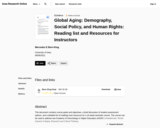
This document contains course goals and objectives, a brief discussion of student assessment options, and a detailed list of readings and resources for a 16-week semester course. The course can be used to address two Academy of Gerontology in Higher Education (AGHE) competencies: Social Aspects of Aging, Research and Critical Thinking.
Versions of this course have been taught to both undergraduate and graduate students in gerontology, public health, global studies, and social work.
The conceptual framework used to select and organize course materials is the United Nations Principles for Older Persons. The first half of the course lays the foundation to understand population aging basics and relies heavily on sections of the Population Reference Bureau's, Population Handbook, as well as United Nations reports. The second half of the course focuses on the UN Principles for Older Persons, with readings related to each principle: Independence, Participation, Care, Dignity, and Self-Fulfillment. Two other UN frameworks introduced in the course are: WHO Active Aging Framework and the UN Sustainable Development Goals.
A main message of the course is that the meaning of "older adulthood" is a product of society. It can and does change over time. Societies can choose to develop programs and policies that affirm the older adulthood stage of life or can stigmatize or ignore the life stage. Each approach has implications for all members of society.
- Subject:
- Social Science
- Social Work
- Material Type:
- Syllabus
- Author:
- Mercedes Bern-Klug
- Date Added:
- 08/16/2021